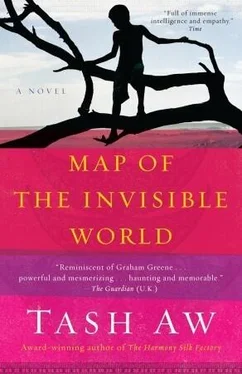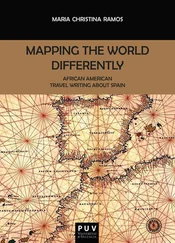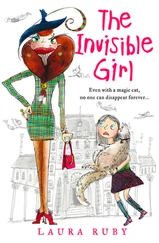Tash Aw - Map of the Invisible World
Здесь есть возможность читать онлайн «Tash Aw - Map of the Invisible World» — ознакомительный отрывок электронной книги совершенно бесплатно, а после прочтения отрывка купить полную версию. В некоторых случаях можно слушать аудио, скачать через торрент в формате fb2 и присутствует краткое содержание. Год выпуска: 2010, Издательство: Spiegel & Grau, Жанр: Современная проза, на английском языке. Описание произведения, (предисловие) а так же отзывы посетителей доступны на портале библиотеки ЛибКат.
- Название:Map of the Invisible World
- Автор:
- Издательство:Spiegel & Grau
- Жанр:
- Год:2010
- ISBN:нет данных
- Рейтинг книги:4 / 5. Голосов: 1
-
Избранное:Добавить в избранное
- Отзывы:
-
Ваша оценка:
- 80
- 1
- 2
- 3
- 4
- 5
Map of the Invisible World: краткое содержание, описание и аннотация
Предлагаем к чтению аннотацию, описание, краткое содержание или предисловие (зависит от того, что написал сам автор книги «Map of the Invisible World»). Если вы не нашли необходимую информацию о книге — напишите в комментариях, мы постараемся отыскать её.
comes an enthralling novel that evokes an exotic yet turbulent place and time—1960s Indonesia during President Sukarno’s drive to purge the country of its colonial past. A page-turning story,
follows the journeys of two brothers and an American woman who are indelibly marked by the past — and swept up in the tides of history.
Map of the Invisible World — читать онлайн ознакомительный отрывок
Ниже представлен текст книги, разбитый по страницам. Система сохранения места последней прочитанной страницы, позволяет с удобством читать онлайн бесплатно книгу «Map of the Invisible World», без необходимости каждый раз заново искать на чём Вы остановились. Поставьте закладку, и сможете в любой момент перейти на страницу, на которой закончили чтение.
Интервал:
Закладка:
“Not too bad. Some days it’s worse than others. Today it seems to be all right. The doctor tells me I’m always going to have a funny walk. But I think he’s wrong.” He laughed; a clear, bright laugh that made Margaret feel better.
“What happened, exactly? I’ve only heard sketchy details.”
Karl sighed and bowed his head, nodding weakly. “It’s terrible. I can’t understand how we can do such things to other people.” He paused for a moment, looking at his leg. “I was at Walter’s for dinner. We had just sat down at the table when we heard the police arrive. They simply marched into the house and took him away. There was nothing I could do. I spoke to them in Dutch, I shouted at them. It was barbaric and unjustified, I said, ‘You have no authority to arrest him, I will attest to his good character.’ And that policeman — that brutish Friesian who’s just arrived from Jakarta to lead this witch hunt — do you know what he said to me? He said that if I continued to defend a German national he would assume I was a Nazi sympathizer and a traitor. But that wasn’t the worst of it.” He did not raise his voice but Margaret saw his fine hands curl into fists. “There were two other Dutch people there, Jos Smit and Rudi Kunst. They remained silent the whole time. They never once tried to intervene. Rudi looked down at his food and Jos coughed and looked out the window, and when the police had taken Walter away he started humming along to the music on the gramophone, as if the party was still going on. I stood up and said, ‘We have to do something. Walter is our friend . Nationality isn’t important, he’s one of us here in Bali. This is our home . We have to defend ourselves.’ And these people, these people I’ve called friends, all they could say was that I shouldn’t antagonize the police, that we have to remember that we are Dutch and there was nothing we could do for Walter anymore. We were in his house, eating his food, and that was all they could say. The host was no longer there, but they wanted the party to continue. I don’t know what came over me. I can’t remember very clearly what happened, but next thing I know I was clinging to the policeman’s back like a barnacle on a huge turtle.” He laughed again, but this time it did not make Margaret feel better. “He shook me off and then all I could see was this hulk standing over me, and when he kicked my leg it was as if he wasn’t even making an effort to hurt me. It was just this gesture to say, You’re nothing to me. At first I thought nothing was wrong, I didn’t feel any pain at all. But when I tried to get up I found my foot was completely useless. I felt so weak and helpless, Margaret. And Jos turned to me and said, ‘Here, have some cognac.’ It was unbelievable. He behaved as if nothing had happened. At that moment I hated him.” He sighed. “I hate this pretense.”
“I can sort of understand it, though,” Margaret said. “I mean, look at us. We’re a million miles from the troubles in Europe. People like Jos and Rudi, they think they belong here.”
“But that’s just it,” Karl said, turning to face her once more. He took both her hands and grasped them firmly in his. “It’s all a charade. They don’t belong here. They’re merely trying to run away. I know this because that’s what I was trying to do when I came here — running away from a country I didn’t like, from responsibilities, from family, from everything that was mine. But when something like this happens, you realize that you can’t flee. You have a duty to confront the things that frighten you. You can’t just stand by and watch.”
“But what can you do?” She felt his hands tighten around hers; they felt warm and comforting, and she tried to savor the feeling of his skin against hers. She wanted to capture the sensation so that in years to come she would be able to summon it whenever she wanted, in times when she needed comforting or reassurance, for she knew that she might never feel those hands on her again.
“I don’t know. But there must be something. Do you know why they are rounding up every single German now, even a completely harmless artist like Walter? Three weeks ago a terrible thing happened in Germany. You must have heard about it. In one night, thousands of Jewish shops and synagogues were destroyed and Jews were beaten, killed. Many disappeared in the night. There was glass everywhere on the streets. Ordinary people were turning against their neighbors, those who had been their friends for years but who’d suddenly been declared evil and dangerous. What madness is responsible for this? That, for me, was the sign. It was when I knew I had to leave. My family is still in Holland. Who knows what might happen to them? Hang on, I need to move my leg, it’s getting a bit stiff.”
He led her across the yard toward the studio. There were no more canvases or pots of paint and Margaret could only make out the silhouettes of a few easels framing the view of the valley at night. They sat on the steps at the back of the house, where the land fell away steeply. It was very late; the moon bathed the valley in a white light and at that precise moment it was hard to believe that even daylight was capable of such brilliance.
“Look at this,” Karl said softly. “I don’t think I can bear to leave this place, but I have to.” A night bird started to sing, a two-note call that repeated without the slightest variation.
“Why?” said Margaret, calmly. “If you want to, that’s one thing, but I don’t understand why you have to.” She was lying, she thought, or at best half-lying, because she could understand. Yet a germ of a thought had lodged somewhere in her head, and this invisible, unreasonable thought said: Don’t go, I don’t understand why you are leaving without me.
“Staying here makes me feel helpless. I can’t remain in this paradise while such things are happening in Europe. Everyone on this island pretends that the war has nothing to do with them, but it does. We can’t hide here forever. Look at poor Walter.” The night bird was still singing; the noise it made seemed too sharp and loud for the perfect stillness of the evening.
“We’re probably going to leave too,” Margaret said. “Not immediately, maybe in a few months. My parents are finishing up their work anyway, so it’s time to move on. Nothing ever lasts very long in my life. But this time I think we might at least be moving somewhere with running water and electricity.”
“Where will you go?”
She shrugged. “I’m not sure. I heard whisperings about America. You?”
“Holland. Then, who knows — probably Paris. I liked Paris. But who knows if it will ever be the same again. Things change so quickly, and once they’ve changed they never change back. It’s not true that people leave things or places behind — it’s the things and places that leave us behind.”
The bird that was singing seemed to have changed its tune; now it sounded like an owl, calling in single, ghostly bursts.
“That’s silly,” said Margaret, “I don’t agree. Look at you. Bali is staying put, you’re the one who is leaving. You have a choice, Bali doesn’t.”
“But it is changing, Margaret — you can see that, can’t you? And someday soon it will change so much that you’ll find yourself marooned in a place you no longer know.”
“Not if you change with it.”
“The place I knew a year ago would not have allowed Walter to be taken away so easily.”
“Maybe you didn’t know this place as well as you thought.”
Across the valley, just below the shoulder of the broad hill, Margaret could see a row of lights — a string of pearly globes that glowed like white fireflies. The lights bobbed up and down slightly, as if they were lamps carried on the end of sticks; but the slope of the hill was very steep and Margaret had never noticed any paths there. There was a tightening in her chest and she began to feel a little pale and lightheaded, as if she were about to faint. Sometimes in Bali she had nights like this; she would wake up from a troubled sleep, her lungs and windpipe constricted, making it difficult to breathe. No matter how hard she coughed to try to clear this congestion it would not go away, and she would have to stay awake, listening to her parents’ whispered arguments in the other room, waiting for daybreak, which was the only thing that could bring relief. These were the nights when the malevolent spirits roamed the valleys, the people in the village said; there was dark magic in the air, and that was what caused Margaret’s malaise. “Nonsense,” her mother would say, “it’s just a touch of asthma.” But Margaret had never experienced this discomfort in any other place she had lived. Maybe these Balinese demons were responsible after all; they had taken away the vigorous health of her childhood. And on these nights, if she got out of bed and went to the window, she would often see tiny balls of glowing light drifting across the valley.
Читать дальшеИнтервал:
Закладка:
Похожие книги на «Map of the Invisible World»
Представляем Вашему вниманию похожие книги на «Map of the Invisible World» списком для выбора. Мы отобрали схожую по названию и смыслу литературу в надежде предоставить читателям больше вариантов отыскать новые, интересные, ещё непрочитанные произведения.
Обсуждение, отзывы о книге «Map of the Invisible World» и просто собственные мнения читателей. Оставьте ваши комментарии, напишите, что Вы думаете о произведении, его смысле или главных героях. Укажите что конкретно понравилось, а что нет, и почему Вы так считаете.












